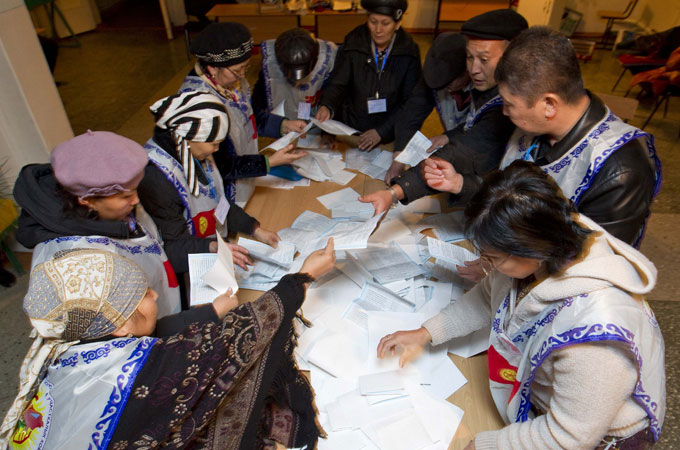Kyrgyz PM wins presidential election
Almazbek Atambayev, president-elect, says US must leave military base in 2014.

 |
| With nearly all of the ballots counted, Atambayev was leading with more than 60 per cent of the vote [Reuters] |
Almazbek Atambayev will become the next president of Kyrgyzstan, after winning an overwhelming share of votes in the first round of the former Soviet nation’s presidential polls, according to preliminary results.
The Moscow-backed prime minister led with more than 60 per cent of the vote, a tally that would make a second round run-off poll unnecessary.
“Atambayev secured a national victory,” Kadyr Toktogulov, campaign spokesperson, said. “There is a very small split in the amount of votes he got in the north and the south.”
Robin Forestier-Walker, reporting for Al Jazeera from the capital, Bishkek, said Atambayev viewed the tally as a unifying result.
“I have just spoken to Atambayev’s press secretary who told me that Atambayev believes that this result means that the country can now move forward and he intends to press ahead with reforms, presumably that means democratic reforms,” our correspondent said.
On Tuesday, the president-elect said the United States should leave its military air base in the Central Asian republic when its lease expires in 2014, the same year NATO-led combat troops are due back from Afghanistan.
Atambayev said Kyrgyzstan would honour its current agreement but he had no intention of renewing the lease on the base.
“When I was appointed prime minister last year, and again this year, I warned employees and leaders of the US embassy and visiting representatives that, in 2014 and in line with our obligations, the United States should leave the base,” he said.
The US military uses the Manas transit centre as a supply route for the war in Afghanistan. The base is adjacent to Kyrgyzstan’s main international airport, also called Manas, just outside the capital Bishkek.
Claims of violations
Atambayev’s opponents have, however, cast doubt on the preliminary results and on the legitimacy of the polls.
His two main challengers from a field of 16 candidates, Adakhan Madumarov and Kamchibek Tashiyev, were each polling just below 15 per cent.
Both candidates enjoy strong nationalist support in the poorer south of the country and have vowed to contest any result they believe to be unfair.
|
Atambayev is up against against two popular nationalist politicians [Al Jazeera] |
On Sunday night, a group including Madumarov alleged violations in the polling, including ballot box stuffing and repeat voting, and suggested they would hold street protests.
“Tens of thousands of voters couldn’t vote in line with their constitutional rights. They are outraged,” Madumarov said.
The central election commission said preliminary data showed more than 57 per cent of voters had turned out for the election.
But six candidates declared the vote unfair. “His challengers last night before the polling stations had even closed were declaring this election illegitimate,” Forestier-Walker said.
“So Atambayev must now make a decision whether or not to declare himself president and whether or not to try to negotiate with some of these other candidates behind the scenes.”
The vote comes 18 months after a popular uprising and ethnic unrest, which left hundreds of people dead.
A clean election would signal the first peaceful handover of the presidency in the mainly Muslim country after 20 years of failed authoritarian rule, the culmination of reforms set in motion after a bloody revolt toppled the president last year.
Instability in Kyrgyzstan worries the US and Russia, which both operate military air bases in the country of 5.5 million people and share concerns over drug trafficking and the possible spillover of Islamist violence from Afghanistan.
“We want an honest president who can uphold the law, somebody who will not allow the country to be divided by clans or by north and south,” said Aida, a 43-year-old schoolteacher who declined to give her surname.
No ‘absolute power’
Those who took power after the April 2010 revolution, led by outgoing President Roza Otunbayeva, have watered down the powers of the president and established parliament as the main decision-making body in Kyrgyzstan.
“A parliamentary system is more suited to the nomadic spirit of the people,” Atambayev, the pro-free-market prime minister who is the flagbearer of the reforms, said after casting his vote.
“After 20 years, we are convinced that we don’t need absolute power, which can transform itself into dictatorship.”
Opinion polls have made 55-year-old Atambayev the clear favourite.
Per capita GDP in Kyrgyzstan, at below $1,000, is less than a tenth of that in its oil-rich neighbour Kazakhstan. The economy relies heavily on remittances from migrant workers and the production of a single gold mine.